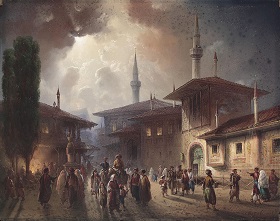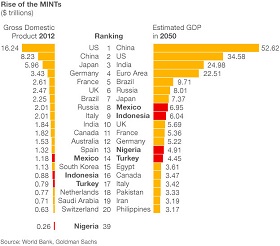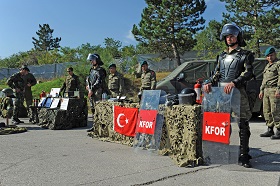Despite the obvious differences on a number of major issues in global politics (such as the Ukraine crisis and the civil war in Syria), Russia and Turkey have managed to minimize their negative impact on bilateral cooperation and dialogue. The presidents of the two countries – Vladimir Putin and Recep Tayyip Erdogan – expect major steps to be taken in the development of relations as part of the fifth meeting of the High-Level Russian–Turkish Cooperation Council (HLCC), particularly in the economic sphere. Russia and Turkey have had their fair share of trials and tribulations this year, both domestically and on the international stage. The destabilization of the political situation in Ukraine and the ongoing civil war in its south-eastern regions are of great concern to the Turkish leadership and its political elites. The question of the Crimean Tatars and the situation in Ukraine in general are taking centre stage in bilateral talks, alongside the more traditional issues of energy cooperation and regional security.
It was no accident that on the eve of Vladimir Putin’s visit to Turkey, media reports emerged that delegates of the newly created Public Council of the Crimean Tatar People had addressed the presidents of Russia and Turkey with a statement refuting information circulating about the “genocide of the Crimean Tatar people” (30.11.2014), in Russian). And a week before the Russian President’s arrival, Erdogan and Prime Minister Ahmet Davutoglu met with former Chairman of the Mejlis of the Crimean Tatar People Mustafa Dzhemilev, who was lobbying for Ankara to support economic sanctions against Russia (25.11.2014). There are forces in Turkey that are prepared to exploit the romantic sentiment of that cross section of the country’s elite which dreams about expansion in the Caucasus, Crimea, the Volga Region and Central Asia, and which views Russia not as a partner, but as a geopolitical enemy. It is sufficient to recall Turkish Minister of Foreign Affairs Mevlüt Çavuşoğlu’s harsh criticism of Russia at the meeting of the Ukrainian–Turkish Joint Strategic Planning Group in Kiev on November 10, 2014.
The issue of Crimea and Ukraine has thus been artificially thrust into the spotlight in Turkey, becoming the focus of public and political debate. Obviously, Turkey cannot help but be affected by the events in Ukraine. To begin with, Turkey has a common Black Sea border with Ukraine, and it is a member – like Ukraine and Russia – of the Organization of the Black Sea Economic Cooperation. Secondly, Turkey has reasonably broad economic ties with Ukraine, of which Crimea formed a significant part (suffice it to say that there are more than 5,000 Turkish businesspeople working in Crimea). Finally, against the background of acute political struggle in Turkey, the Crimean Tatar factor has external as well as domestic significance (the total number of people of Crimean origin living in Turkey is, according to different sources, between four and six million) [1]. These circumstances may seem overly opportunistic and situational, but they are derivatives of more long-term factors. Crimea, and the Northern Black Sea Coast as a whole, were historically part of the “Turkish World”. This goes back to the middle of the 15th century when after the Fall of Constantinople the Ottoman Empire took control of the Black Sea, thus becoming the main power and master of the region for centuries to come. We can, however, place Turkey’s influence in Crimea much earlier – from the times of the Khazar Khaganate in the Middle Ages and its struggles against the Byzantine Empire for the Crimean peninsula, or the Tatar-Mongol invasion of the 13th century, which resulted in the Turkification of the Crimean people.
The Ottoman Empire’s relinquishing of Crimea as part of the Treaty of Kucuk Kaynarca was a watershed moment in the history of the Sublime Porte, a “point of no return” that was followed by a gradual ousting by the Russian Empire of Ottoman influence in the Balkans, the Caucasus and the Black Sea. Even the Crimean War of 1853–1856, which Russia lost due to the participation of Britain and France on the Ottoman’s side, could not halt the Empire’s downfall: in the mid-1860s, St. Petersburg completed its expansion into the Caucasus, and in 1877–1878, the final Russo-Turkish War ended in another defeat for the Ottoman Empire.
The First World War and the October Revolution brought about corrective changes to the geopolitical map of the region. The Ottomans had no illusions that Russia would be unable to withstand the onslaught of the revolutionary period and recover from the turmoil of the War. But Russia’s separation from the northern Black Sea region (Ukraine and Crimea) weakened the country significantly and gave the Ottomans a chance to once again become the leading power in the Black Sea. It is no coincidence that Istanbul so zealously supported its German allies during the Brest-Litovsk negotiations on the matter of Ukrainian independence. The Crimean Tatar’s appeal for help in securing an independent state was effectively brushed aside by the Ottomans, however; their priority was to support the project for Ukrainian independence.
However, the Ottoman Empire’s geopolitical project to “return to the Black Sea” was destined to failure: the victory of the Triple Entente resulted in the partitioning of the Empire, with Sultan Mehmet V being forced to give up Anatolia to save his dynasty. Meanwhile, Mustafa Mustafa Kemal (Ataturk) saw Russia more as a potential ally, capable of helping in the fight against the Entente Powers occupying Turkish lands and gaining power in its own country, than as a geopolitical enemy. This is why he bartered his silent consent for the Soviet subjugation of the Caucasus for the supply of gold and armament, which would become the key to victory of the liberation movement in 1922. The turning point was the Treaty of Kars (1921), which set the new borders between Turkey and the Soviet Republics.
The next period of global instability (the Second World War) was marked for the northern Black Sea region by the deportation of more than one third of Crimea’s 240,000 Tatars to Central Asia and Siberia (Stalin wanted to cleanse the land that could potentially become the focus of new geopolitical tensions by removing its unreliable population). Only in the last years of the Soviet Union were Tatars officially allowed to return to their native land. Today, there are around 300,000 Tatars in Crimea, which constitutes roughly 15 per cent of the peninsula’s population. And many of them are worried about their future under Russian rule, despite the promises made by Vladimir Putin to protect their rights and interests.
The collapse of the Soviet Union in 1991 radically changed the geopolitical situation not only in the Black Sea region, but also in the Greater Middle East as a whole. This is reflected in Turkey’s national security paradigm: the absence of a common border with Russia meant that Moscow was no longer an “immediate threat”.
At the present time, the balance of power is more favourable for Turkey that it was during the Cold War, for example. Turkey has the world’s 17th strongest economy (and it is structurally more diverse than Russia’s), with dynamically developing knowledge-based industries, and the second largest military contingency within NATO (with hi-tech weapons that are primarily developed and produced in Turkey. The 12-year period of relatively stable economic growth under the rule of Recep Tayyip Erdogan and the Justice and Development Party (since 2002) after the crisis-ridden 1990s has instilled in the ruling elite a confidence in their economic and political power unlike anything seen before in the republic’s history. What is more, foreign policy under the Justice and Development Party’s has taken on a completely new meaning, with hints of nostalgia for the Ottoman past and the openly declared desire to restore the historical and cultural ties that were severed with the collapse of the Empire following the First World War. In this context, Turkey’s interest in the northern Black Sea region is clear. There is another factor at play here, and that is energy – Turkey does not have vast natural resources, so this drives its interest in developing potential deposits and diversifying energy supply channels. The Black Sea, with its estimated natural gas reserves, is therefore extremely attractive.
In this context, it would be reasonable to expect Turkey to take a more active stance against Russia’s presence in the northern Black Sea, and Moscow’s Ukrainian policy in general. The political configuration that has been established in 2014 significantly limits Ankara’s prospects of increasing its influence in the region and calls into question any possible energy projects that it may have had with regard to the Black Sea. And on top of that, there is the potential to lose face. However, with the exception of a few formal declarations on the indivisibility of Ukraine and concern with protecting the rights of Crimean Tatars, Ankara has taken a rather passive position on the “Crimean question”. The incumbent Prime Minister Ahmet Davutoglu, architect of Turkey’s “new foreign policy”, said during a particularly violent period in the Ukraine crisis that Turkey “would not fall into [the] trap” of turning the Crimea issue into a “Turkish–Russian crisis”.
Today, Turkey does not fit into the Procrustean bed of West vs. Russia opposition (in contrast to the “bloc confrontation” period): on the one hand, Turkey is a member of NATO and an EU candidate country; on the other hand, it is dialogue partner of the Shanghai Cooperation Organisation and is actively developing ties with Russia (Russia is Turkey’s second largest trading partner after Germany). Prime Minister Ahmet Davutoglu has gone on record as saying that it would be a serious error to cool relations with Russia for the sake of developing a partnership with the European Union.
Ankara’s hands-off position with regard to the Crimean issue is in stark contrast to its stance on Kosovo in the 1990s. Back then, Turkey was one of the most vocal supporters of separating Kosovo from Serbia, not taking into account that it could negatively impact the development of the problem of Kurdish separatism in its own country. And this despite the fact that Turkey had absolutely no economic or geopolitical interests in Kosovo, nor was it guided by feelings of nostalgia for its Ottoman past.
It is quite obvious that pragmatism dominates Ankara’s foreign policy in this area, the desire to avoid economic losses. Especially now, at a time when the economic situation in the country is far from stellar (the budget deficit for the first three quarters of 2014 slumped to 12 billion lira – around $5.4 billion – slowing down economic growth significantly) and close economic and trade cooperation with Russia can help overcome financial difficulties. In this respect, the model for Russian and Turkish cooperation that has taken shape in recent years and presupposes non-susceptibility to the heightening of artificial tensions and conflicts and focuses on mutual interests could be extremely beneficial. To be sure, Turkey is in no hurry follow those countries who have joined the United States and the European Union in imposing sanctions against Russia. On the contrary, bilateral trade is both growing and becoming more diversified. More and more Turkish products are becoming available in Russian grocery stores. Turkish producers of dairy products, including cheese (with an estimated market volume of $4 billion), fish, confectionary ($2 billion), cereals, etc. As for the import of fresh fruit and vegetables, Turkish producers have already been given the green light: the Federal Service for Veterinary and Phytosanitary Surveillance has made an exception for Turkey to import agricultural products into Russia via Ukraine. In turn, Russia is increasing its supply of foodstuffs to Turkey (suffice it to say that Turkey has become one of the main buyers of Russian wheat in recent years).
However, Turkey’s position with regard to the Ukraine conflict and the Crimean issue is not simply one of pragmatic economics, it is also a matter of values. For today’s religious and conservative elite the foundation of the “New Turkey” project is Islam, which gave stability to the Sublime Porte as a world power and removed ethnic particularism, rather than the Ataturk doctrine of nationalism that spawned the “Kurdish problem”. In other words, the emphasis has shifted from the idea of Turkey as the centre of the Turkic world to the idea of Turkey as a “central Afro-Eurasian state” and the centre of the Muslim East. In a geopolitical sense, this means the priority of the historic core of the Islamic world – Palestine, Iraq, Syria and Egypt. This at a time when the significance of the northern Black Sea region and the Crimean Tatars that were once characteristic of the Ottoman Empire’s highest powers has all but disappeared: the region and its problems are in many ways peripheral to Turkey today. And Russia can, if it turns to the model for Russian–Turkish relations developed in the first decade of this century that emphasize pragmatism and the furthering of mutual interests, eventually find an acceptable mechanism for working with Turkey on the “Crimean issue”.
1. Shlykov, P.V., Ulchenko, N.Yu. The Dynamics of Russian–Turkish Relations in the Context of Increasing Global Instability. Moscow: нестабильности. М.: Institute of Oriental Studies of the Russian Academy of Sciences, 2014, p. 79 (in Russian).







